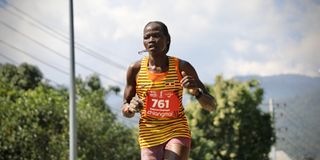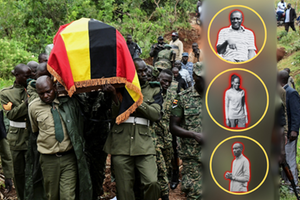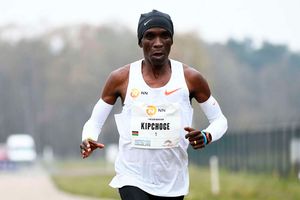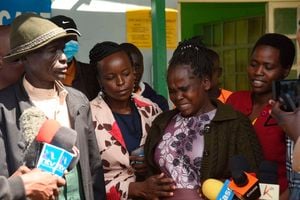
Rebecca Cheptegei, 2022 World Mountain Running Champion.
The murder of Ugandan Olympian Rebecca Cheptegei by her Kenyan ex-partner put gender-based violence in the spotlight last year.
The death of the Ugandan athlete shocked athletics fans in Kenya, Uganda and beyond. She is the third female athlete to be killed in Kenya in the last three years, and there have been growing calls for the authorities to address the death threats to women and girls in athletics.
Athletics Kenya President Jackson Tuwei said at her funeral on September 14: "We are losing female athletes in a way that is unacceptable and it must stop.
The growing list of victims of gender-based violence in sport was further highlighted in October when Agnes Tirop, 25, a record holder and two-time World Championships bronze medallist, was found murdered in her home in Iten.
Monica Jeptoo, 38, was also stabbed to death in Iten. Her body was found in a pool of blood in her rented house on the outskirts of the town on May 7, 2022.
Damaris Mutua, 28, a Kenyan-born Bahraini, was found dead in Iten on April 19, 2022.
Many female athletes now believe that the rising cases of gender-based violence affecting sports stars is due to the lack of strict laws against perpetrators of GBV, which has allowed the vice to continue unchecked, reducing star female athletes to an endangered species.
Mary Musau, a counselling psychologist and founder of Build and Restore Counselling Services, reveals what makes the abuser's victims stay in an abusive marriage.
"What keeps female athletes in abusive relationships is the elusive hope that the man will change his bad behaviour".
There is also the stigma of the high social status attached to marriage.
Then there are social norms, and society has certain expectations of women.
"There is pressure from society on how a woman should behave and act," she observes.
She says some of the red flags a woman should look out for in such a relationship include emotional abuse, psychological abuse and physical abuse.
On the physical red flags, Musau says it starts with a slap in a conflict that is repeated several times.
"When a man slaps a woman, it leads to death threats and these are things a woman should not take lightly. It is a serious red flag," she says.
She warns that the next thing that happens after such abuse is an apology from the perpetrator.
"This makes the woman give in easily, but this is not okay because it is often repeated."
Another sign she warns female athletes to look out for is the behaviour of the men in their lives.
"A man who is struggling with mental illness and is depressed is another red flag. As a woman, you should find out how he relates to family members and your children".
"Find out if the man is getting enough sleep. Watch his movements inside and outside the house. Observe if he disappears from the house, if he carries weapons and if he shows signs of aggression.
Fidelis Wambui Karanja, founder of Young African Women Initiatives (YAWI), a women-led human rights organisation based in Nakuru City, says there is a need to raise awareness of women's rights.
"More women will continue to die because the GBV they experience is strongly supported by outdated cultural beliefs and values that perpetuate it as a normal part of the relationship," said Fidelis.
She died on 5 September after suffering 75 per cent burns, while her former lover suffered 30 per cent burns and died a week later.
Athletics Kenya executive member in charge of women's welfare, Elizabeth Keitany, says the federation has developed safeguarding policies to protect girls and women in athletics.
"We have created a safe environment for the affected girls and women athletes to continue with their athletics careers by introducing toll-free hotlines to report GBV cases," said Ms Keitany.
She said the AK has established a GBV office in Eldoret town to initiate programmes focused on accelerating efforts to eliminate GBV in the region.
"This GBV office in Eldoret City will be staffed by qualified personnel who can deal with athletes suffering from GBV in order to prevent violence, protect survivors and end impunity," she said.
A report by a nine-member task force led by former marathon world record holder Catherine Ndereba, appointed by former Sports Cabinet Secretary Amina Mohammed, revealed that female athletes were more affected than males.
The report's findings also included detailed accounts of gender discrimination against women in the sports industry.
Cheptegei, a Ugandan marathon, cross-country and long-distance runner, Ugandan national record-holder and former world champion in mountain running, competed in the Paris 2024 Olympic Games and finished 44th in the women's marathon.
Female athletes in Kenya agree that the Olympian's murder highlights the problem of femicide in Kenya.
"It seems that female athletes in Kenya's running heartland are pure survivors under inhumane GBV conditions," said one athlete who requested anonymity as she is still in an abusive relationship.
"It is a difficult time for female athletes in the North Rift region and Cheptegei's murder highlights the problem of femicide in Kenya. Cheptegei's death is a clear red flag of the dangers faced by the majority of female athletes," said another female athlete in Iten.
As the killings of female athletes continue unabated, it remains to be seen whether this statement by the Murkomen will be translated into action or whether, as in the past, it will remain a public relations statement gathering dust on the shelves until another female athlete falls victim.
Top female athletes who died as a result of gender-based violence in Kenya:
1. Agnes Tirop
2. Monica Jeptoo
3. Damaris Mutua
Male athletes who tragically lost their lives in their prime
1) Samuel Wanjiru
2) Kelvin Kiptum
4) Nicholas Bett
5) David Lelei
6) Clement Kemboi
7) Kipyegon Bett










